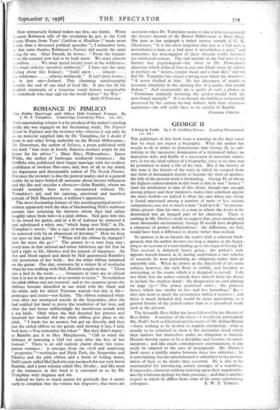The Polite Marriage and Other 18th Century Essays. By
ROMANCE IN PIMLICO
J. M. S. Tompkins. (Cambridge University Press. cos. 6d.) Tins entertaining volume is a by-product of the author's reading while she was engaged on her fascinating study, The Popular Novel in England, and the reviewer who criticises it can only do so on material supplied him by Dr. Tompkins, for I doubt if there is any other living authority on the Bristol Milkwoman ; Dr. Downman, the author of Infancy, a poem published with the wish " that even in hostile America mothers might be the better for his advice " ; Mary Hays, Philosophess ; James White, the author of burlesque mediaeval romances ; the Griffiths who publicised their happy marriage with the reckless confidence of modern film-stars, and, best of all to my mind, the ingenuous and disreputable author of The Scotch Parents. For once the reviewer is also the general reader, and as a general reader let us leave behind all nonsense about literary influences and the like and consider a character—John Ramble, whom we should certainly have never encountered without Dr. Tompkins's aid, and his cunning, emotional and heartless pursuit of Nell Macpherson, a milliner's apprentice.
The most fascinating feature of this autobiographical novel— written apparentlywith the idea of blackmailing Nell's stubborn parents into returning his mistress whom they had rather roughly taken from him—is a pink ribbon. Nell gave him this to tie round his guitar, and in a fit of jealousy he removed it and substituted a white one, " which hung over Nell," in Dr. Tompkins's words, "like a sign of wrath and estrangement, to be removed only by an abasement of devotion." How we keep our eyes on that guitar ! " When will the ribbon be changed ? how far must she go ? " The answer is—a very long way ; every man in that rational and rather lubricious age felt that he had a right to life, liberties and the pursuit of happiness. An Act and Deed signed and dated by Nell guaranteed Ramble's sole possession of her body : but the white ribbon remained on the guitar. One day, overcome by a violent fit of toothache when he was walking with Nell, Ramble sought an inn. " There was a bed in the room. . . . Situations at times are so critical that it is not in the power of us mortals to resist." Nevertheless the pink ribbon was not restored : and as the suspense grows the ribbons become identified in our mind with the black and the white sails for which Tristram waited—but this is life— grotesque and comic—not fiction. The ribbon remained white even after her attempted suicide in the Serpentine, after she had scalded her hand to prove the resolution of her love, and after she had borne unflinchingly his murderous assault with a tea knife. Only when she had deserted her parents and deceived her mother did the white ribbon give place to the pink. " I made her no answer, but got up directly, and then put the exiled ribbon on my guitar, and showing it her, I said, look here.-:–You remember the token." But they didn't marry : as Ramble put it to Mrs. Macpherson, " Call to mind the delicacy of marrying a Girl too soon after the loss of her honour." There is an odd realistic charm about this trans- parent romance : it emerges from the vivid and surprising " properties "—toothache and Hyde Park, the Serpentine and Pimlico and the pink ribbon and a kettle of boiling water, Nell's uncle called McClackwho was too much for not very brave Ramble, and a poor relation called Mrs. Drulin ; and like most of the romances in this book it is conveyed to us by Dr. Tompkins with elegance and wit.
Indeed we have so much reason for gratitude that it seems surly to complain that the volume has longueurs; that there are occasions when Dr. Tompkins seems to take a little too seriously the literary interest of the Bristol Milkwoman or Mary Hays. She puts as her epigraph a rather unwise remark of G. K. Chesterton, " It is too often forgotten that just as a bad man is nevertheless a man, so a bad poet is nevertheless a poet," and sometimes her investigation of these obscure works becomes too whimsical-serious. The real interest in the bad poet is not literary but psychological—the twist in Dr. Downman's character which induced him to put into blank verse his advice to mothers on " rickets, regular meals and a fruit diet," and we feel Dr. Tompkins has struck a wrong note when she observes : " A nerve thrilled in him. He has directness of attack—a resonant simplicity in the opening line of a poem, that recalls Sidney." And occasionally she is guilty of such a phrase as " Downman zealously inverting the garden-mould with his new-found strength." It is as though she had been temporarily possessed by her curious by-way writers, with their strenuous euphuism—she will really have to be careful of Ramble.
GRAHAM GREENE.






































 Previous page
Previous page